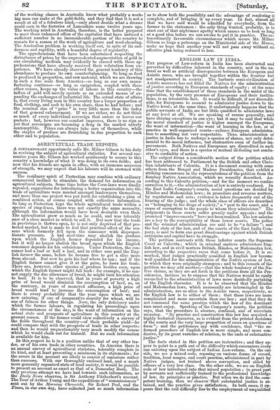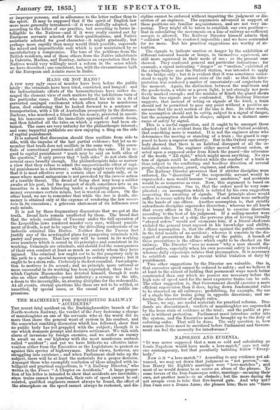ENGLISH LAW IN INDIA.
Tire progress of Law-reform in India has been obstructed and perverted by difficulties inherent in the country, and in the na- tural as well as artificial discrepancies between the European and Asiatic races, who are brought together within the frontier but not amalgamated in society. The barbaric semi-civilization of Asiatic manners has not fitted the Natives for the administration of justice according to European standards of equity ; at the same time that the establishment of those standards in the midst of the population, by the very presence of Europeans and their institu- tions, is an irresistible fact. It would be difficult, if not discredit- able, for Europeans to consent to administer justice down to the Native level; at the same time, it unfortunately happens that the public servants of India are but little qualified to administer laws at any level at all. We are speaking of course generally, and have shining exceptions in our eye ; but it may be said that while the moral standard of justice is higher amongst the Europeans, the want of information—the want of learning in the law, or of practice in well-organized courts—reduces European administra- tion to something not very respectable. Thus, administration of justice in India has to undergo a species of shame, not only detri- mental to its moral influence, but obstructive even of further im- provement. Both Natives and Europeans are discredited in each other's eyes, and there is a species of mutual ill-feeling not condu- cive to cordiality of action.
The subject forms a considerable section of the petition which
has been addressed to Parliament by the British and other Chris- tian inhabitants of Calcutta. It is a document coming with some others from the Bengal and Madras Presidencies, that exhibit a striking concurrence in the representations of the petition from the Bombay Native Asasociation, which we recently described. Ac- cording to this Calcutta petition,—and for the moment we confine ourselves to it,—the administration of law is entirely confused. In the East India Company's courts, social questions are decided by Ilindoo and Mahomedan laws ; in procedure and revenue matters, by regulations and acts ; evidence is taken frequently out of the hearing of the judge ; and the whole class of officers are described as "belonging to the dregs of society," a "pest to the court, and a cause of corruption to the people to whom they administer." The judgments in these courts suffer greatly under appeals ; and the promised " improvements " have not been realized. The low salaries are a key to the corruptibility of these lower courts. The police and the criminal administration are said to be "a failure "; and the bad state of the law, and of the courts of the East India Com- pany, is said to form one great disadvantage against which British enterprise and capital have to struggle.
The petition contrasts with these inferior courts the Supreme Court at Calcutta ; which in criminal matters administers Eng- lish law, and in civil matters British, Hindoo, or Mahomedax law, according to the respective races that come before it. It is re- marked, that judges practically qualified in English law become well qualified for the administration of the Native system of law, to which they were originally strangers ; and to this remark of the petition we may add another,—that the whole tendency of the Na- tive claims, as they arc set forth in the petitions from all the Pre- sidencies, inclines us to suppose that the Natives would be easily reconciled to the administration of laws more decidedly partaking of the English character. It is to be observed that the Hindoo and Mahomedan laws, which necessarily are intermingled in the administration, are as alien to the Asiatic races, respectively, as the English law is to either of them ; that these laws are more complicated and more uncertain than our law ; and that they do not command the same prestige which the law of the dominant race must enjoy. Speaking of the Company's courts, the petition says, that the procedure is obscure, confused, and of uncertain meaning. "By practice and construction this law has acquired a highly technical character, as is evident from the printed decisions of the courts and the very large proportion of cases on questions of form"; and the petitioners say with confidence, that "the re- formed procedure of English law is more simple, and more con- ducive, by its great varieties of relation, to the ends of substantive justice." The facts stated in this petition are instructive ; and they ap- pear to point to a path out of the difficulty which encounters every one entering upon the subject of Indian Law-reform. On the one side, we see a mixed code, reposing on various forms of record, tradition, local usages, and court practice, administered in part by Native judges, not trained above corruption, and aided by officers of a very low class. On the other side, we see an English code of law introduced into that mixed population ; in great part by servants not sufficiently trained to the professional knowledge of law, its principles or practice. But when we do find the com- petent training, then we observe -that substantial justice is at- tained, and the practice gives satisfaction. In both cases, it ap- pears that the real difficulty lies in the employment of unqualified or improper persons, and in adherence to the letter rather than to the spirit. It may be supposed that if the spirit of English law were more generally introduced—if it were skilfully adopted, not according to the letter of our practice, but according to forms in- telligible to the Natives—and if it were really carried out by European servants selected for their qualifications, and Native assistants selected for good character—it might gradually, but perhaps more rapidly than many would think possible, supersede the mixed and impracticable code which is now maintained by so unsatisfactory a compromise. The tone of the petitions from the British residents, and of those others from the Native inhabitants in Calcutta, Madras, and Bombay, induces an expectation that the Natives would very willingly meet a reform in the sense which we have described; one consistent, too, with the circumstances both of the European and Asiatic races in India.



































 Previous page
Previous page